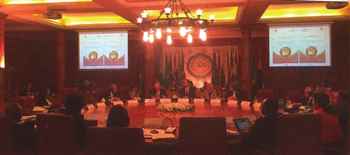
Permanent Representative of Sri Lanka to the UN in Geneva, Ambassador Ravinatha Aryasinha said that in the Sustainable Development Goals (SDGs) which are incorporated into the Development Agenda, migration cuts across several aspects of development, including improving the quality of human mobility through well managed migration policies; displacement among issues related to peaceful and inclusive societies and Disaster Risk reduction; address trafficking in a comprehensive manner and action by Finance for Development Action Agenda which deals with remittances. Ambassador Aryasinha made this observation in his opening remarks while he moderated the Session on ‘Reflecting on the outcomes of the 2013 UN high level dialogue on international migration and development with a view to implementation of the 2030 agenda for sustainable development’ of the Fifth Global Meeting of Chairs and Secretariats of Regional Consultative Processes on Migration (RCPs) held on 21st October 2015 in Cairo, Egypt.
Ambassador Aryasinha commended the significant role played by the IOM in actively contributing to the process of formulating the Post-2015 Development Agenda by advocating for migration to be recognized as an essential component of any future development framework and of national development policies and plans.

Initiatives for migrants from the Asian region taken under Sri Lanka's Chairmanship of the Colombo Process (CP) was commended at the Fifth Global Meeting of Chairs and Secretaries of Regional Consultative Processes on Migration (RCPs), held in Cairo, Egypt, 21-22 October 2015.

A series of initiatives aimed at boosting protection and improving conditions of employment for millions of foreign workers in the Gulf have been agreed upon at the Third Ministerial Consultative Meeting of the Abu Dhabi Dialogue (ADD) comprising Asian countries sending and receiving labour, which concluded in Kuwait last week. The 'Kuwait Declaration' noted that "recognizing that individual government's efforts may fall short, we resolve to work together to prevent and sanction exploitative recruitment practices that place workers at great risk and undermine fundamental rights".
Ministers and Heads of Delegations from Afghanistan, Bahrain, Bangladesh, China, India, Indonesia, Kuwait, Nepal, Oman, Pakistan, the Philippines, Qatar, Saudi Arabia, Sri Lanka, Thailand, United Arab Emirates and Vietnam attended this meeting, held on 26-27 November 2014 under the chairmanship of Kuwait. Sri Lanka's Permanent Representative to the United Nations in Geneva Ravinatha Aryasinha led the Sri Lanka delegation.

Sri Lanka stated that a comprehensive labour migration policy has been developed, with a view to managing labour migration properly and orderly and to ensure dignity, security and equity for Sri Lankan nationals seeking employment abroad. The Government of Sri Lanka has taken concerted efforts in several policy key areas, namely, improving recruitment practices and educating labour agents, pre-departure orientation, empowerment of those migrants who have re-entered the country, facilitating cheaper, faster, and safer transfer of remittances.

Sri Lanka's Permanent Representative to the UN in Geneva Ravinatha Aryasinha, has said Sri Lanka which took over the chair of the Colombo Process (CP) one year ago was of the view that if it were to make a difference and ensure that some real benefits would accrue to the people of the member countries, it was important that they address the tough issues, including 'Ethical Labour Recruitment Practices'. He noted that in ongoing deliberations the CP is seeking to harmonize existing national regulatory frameworks, promote Standard Employment Contracts (including addressing issue of contract substitution and create a registration mechanism for contracts), consider common minimum wage levels, and conditions that promote health and well-being and insurance protection, and to develop a common position on ethical recruitment practices.
Ambassador Aryasinha made these observations and reviewed the progress made by the CP under Sri Lanka's leadership, when he addressed an Expert Consultation on Recruitment Practices and their Impact on Human Rights of Migrants, held at the Palais des Nations in Geneva on 31 October 2014. The consultation was convened by Mr. Francois Crepeau, Special Repporteur on the Human Rights of Migrants and was attended by diplomats, academics, representatives of the ILO and IOM, Recruitment specialists, as well as NGOs involved in the field.

The first Senior Officials' Meeting of the Colombo Process under Sri Lanka's chairmanship reached a successful conclusion on Wednesday 7 May in Colombo with discussion and agreement on key labour migration principles, including the promotion of cheaper, faster and safer transfer of remittances, standard employment contracts, ethical labour recruitment, and cooperation and dialogue with the Abu Dhabi Dialogue (ADD). Established in 2003 in Colombo, the Colombo Process is a Regional Consultative Process on Labour Migration (RCP) of 11 labour sending countries from Asia comprising Afghanistan, Bangladesh, China, India, Indonesia, Nepal, Pakistan, Philippines, Sri Lanka, Thailand and Vietnam - all of who were represented at the meeting. The IOM, SDC and ILO were also associated with the Meeting. Sri Lanka assumed the chairmanship of the Colombo Process in October 2013.

Minister of Foreign Employment Promotion and Welfare Dilan Perera met with his counterpart, Secretary Labour and Employment Rosalinda Dimapilis-Baldoz of the Philippines on Monday 6 January in Manila. The areas for collaboration discussed at the meeting included pre-departure orientation, qualification recognition process, comprehensive information orientation programmes and recruitment standards.
Minister Perera and Secretary Dimapilis-Baldoz met in their respective capacities as the current chairs-in-office of the two Regional Consultative Processes on the management of overseas employment and contractual labour in Asia, the Colombo Process and the Abu Dhabi Dialogue, respectively. Sri Lanka assumed the chair of the Colombo Process, comprising 11 countries of origin in Asia, last October in Geneva. CP comprises Afghanistan, Bangladesh, China, India, Indonesia, Nepal, Pakistan, Philippines, Sri Lanka, Thailand and Vietnam, while ADD has a membership that includes all CP members, and additionally receiving countries Bahrain, Kuwait, Malaysia, Oman, Qatar, Saudi Arabia, Singapore, United Arab Emirates and Yemen.
